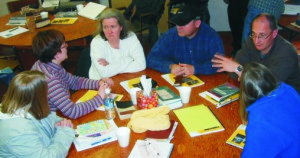by George Hertwig
Suppose you needed brain surgery. Who would you like for a doctor? A well meaning general practitioner? Or an equally well meaning brain surgeon? What would you think of someone suggesting that the brain surgeon’s extra training was a waste of time and money?
 Well, my point is not to insult your intelligence by asking questions with obvious answers, but to illustrate why NCEM is committed to professional training for our staff. We believe in specialized training and re-training because we are called to a work with eternal consequences.
Well, my point is not to insult your intelligence by asking questions with obvious answers, but to illustrate why NCEM is committed to professional training for our staff. We believe in specialized training and re-training because we are called to a work with eternal consequences.
People who’ve never had effectual exposure to the message of the Bible are still rooted in unbiblical perversions of the truth dating back to the Tower of Babel. If it took just a few generations to pervert the descendants of those who walked off the ark which faithful Noah had built, how much more perversion has come about in the years since then?
These are the belief systems that confront missionaries. Paul likens them to “fortresses ready for destruction” (2 Cor. 10:4). This is a high calling by God and will never be accomplished in our own strength, but His.
Missionaries of all cultural backgrounds face these and other challenges in planting churches.
So, does this sound like we would benefit from specialized training? Is it God-honouring if we commission missionaries who are ill prepared for the task dearest to His heart? Is it fair to the host cultures?
Needless to say, we appreciate your prayers.
Training Agreement
NCEM now has a missionary training with an agreement with Ethnos Canada (formerly New Tribes). After much prayer, investigation and deliberation, NCEM is taking advantage of an excellent established training program for those serving in cross-cultural church multiplying.
This three-semester program best suits our needs (and the cost is very reasonable) for those headed for church planting — acquiring skills necessary to learn culture and language. “That’s also how long it takes to learn to prepare Bible lessons which aim at the radical displacement of deeply held unbiblical core beliefs,” notes George Hertwig. “The Holy Spirit endeavors to convict and transform at that very level with the Gospel.”
Training (and re-training) has become a greater priority in NCEM.
Since 2008 the majority of our missionaries have attended one or more of the one-week sessions presented by Worldview Resource Group, a ministry assisting missions around the globe (www.wrg3.org). Course topics have included: Worldview, Animism, Chronological Bible Teaching, and Five-Stage Church Planting.
While the word “training” evokes images of classrooms and reading assignments, – and that is part of it – it’s really about people. It’s training our missionaries can use every time we spend time and communicate with someone.
Here are comments from our missionaries after attending WRG sessions:
DEEPER LEVEL
“The (WRG) training has helped me realize the need to know our audience. Then we can appropriately address the person on deeper levels, addressing their views of God, the world, life, death, sin, etc. and bring them to face the flaws in their own worldview, in contrast to the truth of God in His Word.”
CAN YOU REPEAT THAT?
“Do I notice people repeating what I’ve told them? Unless what I teach is reproducible, it’s not effective. Stories are effective. Through Bible stories we can teach of creation, judgment, sacrifice and redemption.”
THINKING THROUGH
“Asking a person specific questions (as Jesus did), rather than just unloading information helps them think through concepts, and apply it. This has made a difference.”
UNITY BUILDING
“[The latest WRG session] amounted to what was perhaps the most unity-building gathering our Mission has experienced in the last two decades.”
ALL ABOUT PEOPLE
“We need to be intentionally relational in all we do. The first people we meet when arriving in a community may be the future believers and leaders in the church we believe will one day exist. It can make the difference between someone being attracted to the Gospel or rejecting it.”
BIBLICAL PRINCIPLES
“[The WRG training] is a re-enforcement of the Biblical principles of discipleship and evangelism. It is a way of allowing me to see more clearly the Biblical Worldview and how to present it to others in ways they will clearly understand.”
BEING HEARD?
“It’s impacted the ways I present Christ to others … understanding how it is being heard. [It can be compared to] having the most powerful radio transmitter on the highest mountain … but if there are no receivers … it is for naught.”
TALKING LONGER
“There have been situations where I’ve refrained from speaking from my line of thought and, instead, heard someone out more completely … People tend to open up a bit more and hold a more lengthy conversation.”
FAULTY FOUNDATIONS?
“Prov. 18:13 says: ‘He that answers a matter before he hears it, it is folly and shame unto him.’ I think too often we have been quick to ‘give the Gospel’ using cliches and words which people don’t understand. Thus we have built on faulty foundations.”
EVERY AREA OF LIFE
“Nothing in a person’s worldview exists in isolation. When people come to Christ, their whole belief system comes under scrutiny. God’s message will affect every area of one’s life. This is a weighty matter.”
THE RIGHT PICTURE?
“I’ve realized that animists have no problem including another deity into their already great plethora of spirit beings. As such, they will gladly raise their hand to accept Christ into their ‘need/fear-based’ religion. This is especially true if Jesus is presented as a ‘spiritual power broker.’ This gives the wrong picture of Christ.”

Adapted from our Northern Lights magazine (#515). Note: some of the locations and involvements of our missionaries may have changed since the original publishing of this article.

